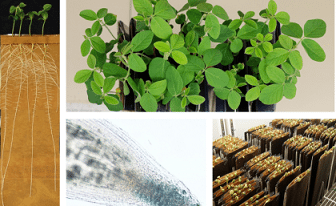AN Australian study of peptide hormones critical for plant development could result in enhanced agricultural yields, benefits to tissue culture, and improved knowledge of peptide hormones in humans.
The study, involving University of Queensland and University of Sydney researchers, included the synthesis and examination of CLE peptides, a relatively new family of growth hormones in plants.
Dr Brett Ferguson of the Centre for Integrative Legume Research, in the UQ School of Agriculture and Food Sciences, said the research was exciting because CLE peptides had essential roles in plant growth and development, increasing productivity and adaptation to environmental factors.
“CLE peptides can be used to manipulate plant growth,” Dr Ferguson said.
“Even a small increase in yield can be massively important to agriculture – increasing food production and food security, whilst enhancing agricultural sustainability.
“Other studies have demonstrated a variant of one CLE peptide capable of producing bigger tomato fruit, and our ability to synthesise the peptides now opens up new areas of research in understanding the specific details of CLE hormone signalling.
“This is a fast-growing research area due to its importance to agriculture, food, and other industries.”
As well as relevance to plant development, the findings are relevant to animal peptide signalling.
“CLE peptides are specific to plants, but peptides and associated receptors are also found in animals and humans, so understanding mechanisms in plants can benefit our understanding of similar mechanisms in humans,” he said.
CLE peptides are very difficult to detect and extract from plants due to their small size and extremely low concentration.
As a result, the peptides need to be chemically synthesised to test their function in biological assays.
However, the synthesis of CLE peptides is made challenging by the presence of a ‘triarabinose’ sugar unit that is naturally linked to the peptide in plants.
Dr Ferguson said that existing approaches for the synthesis of the sugar unit were low yielding, and therefore a new and efficient synthetic strategy was developed in collaboration with the Payne Laboratory (School of Chemistry, University of Sydney).
This new approach was used to chemically synthesise CLE40, a CLE peptide that modulates root development by controlling the stem cell population of the root.
“This is a very important peptide hormone for plant growth,” he said.
“We also developed a new assay to feed the CLE40 peptide and monitor root growth.
“Using this assay, we showed that the sugar side chain was vital to signalling activity. Modifying root architecture via key developmental factors is viewed as a pivotal step in enhancing agricultural sustainability and food security.
“The new synthetic strategy can now be used to synthesise other CLE peptides, which can subsequently be used in feeding studies to establish their activity.”
Source: UQ
The study, Arabinosylation Modulates the Growth-Regulating Activity of the Peptide Hormone CLE40a from Soybean, was published in Cell Chemical Biology (doi: 10.1016/j.chembiol.2017.08.014).
Dr Ferguson’s group also recently published the complete CLE peptide family of two legume species in Scientific Reports, in addition to publishing another article in Scientific Reports about a CLE peptide receptor having a role in regulating shoot architecture.


HAVE YOUR SAY